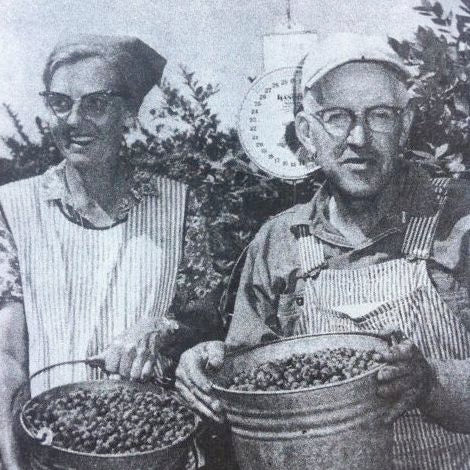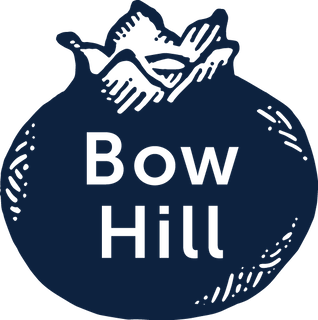
History of Bow Hill Blueberries
In 1933, Ane and Severin Anderson purchased the property that is now Bow Hill Blueberries. They were farmers of many crops over their years here: goldenseal (a medicinal herb), mink (for oil and fur), and strawberries. Eventually, in 1947, they met a traveling blueberry salesman from New Jersey and thus began the blueberry legacy of this property.
Goldenseal was one of the original crops grown on the property and the drying kiln is still intact on our property. Now used for harvest supply storage, we like to imagine what life was like in the 1930s when they were growing and drying goldenseal. If you've ever been to our farm, you've probably seen the Mink House. It's a tribute to one of the other original crops raised here — mink (in the same family as weasels and ferrets). The Mink House is (now) where our staff enjoy lunch during the warmer months and a place to hold events. Though controversial today, mink oil and fur were widespread during the 40s as a leather treatment, and for coats and other garments, respectively. When World War II hit and gasoline became rationed, the Anderson's could not justify the drive to Bellingham where the mink food was sold. Any guesses as to what minks ate? So, for a few years after they went out of the mink business, they relied on goldenseal, and another crop, strawberries, to keep them afloat.
Then, in 1947, a traveling salesman from New Jersey brought the Jersey blueberry (an heirloom variety derived from the Rubel) to Bow. The Anderson's decided then-and-there that blueberries were going to be their new crop. They went ahead and planted two-acres to the west of the farm house of those Jersey bushes. That part of the farm is now referred to as the "Jersey Jungle," because the plants are so big and tall, that we need ladders to pick them in parts of the jungle. Then the next year, the south end across from the slough was planted with a variety called Stanley. In 1954, the back of the house was planted with Rubels and Bluecrop, and finally, in 1956, the east side of the house was planted, more Bluecrop.

Throughout Ane and Severin’s years of living on the farm and farming blueberries, they supplied jobs for many local kids. On an average summer day, there would be fifty+ kids picking; many of them to raise money to buy their clothes for school (do any of you remember working picking fruit or veggies to pay for school clothes?). Stella Anderson Nieman, Ane and Severin’s second daughter, recalls learning two things from her father while her and her older sister, Audrey, helped out on the farm: "[1] you do not let weeds go to seed and, [2] berries need to be picked ripe to have good flavor."

In 1972, the Andersons sold the farm to Severin’s brother and sister-in-law – Gus and Dorothy (Dot as many knew her). Around this time, the red building that houses the processing facility and farm store was built. Many visitors to the farm still remember picking blueberries for Gus and Dot as kids. Word is, when Dorothy Anderson was running the farm, she kept boy and girl pickers separate to make sure no mischief was happening back there in those bushes!
In 2002, Gus passed on, followed by Dorothy in 2010. Dorothy, with the help of her sons, ran the farm for 6 and a half years without a partner. You go, girl (we love strong women, past and present)! Dorothy and Gus helped found the WA Blueberry Commission in 1969 and both served on it, as well as the United States Highbush Blueberry Council.
Since their children had moved out of the area and none of them wanted to take on the task of running a blueberry farm, their children decided, in 2011, to sell the property. And though it's sad that it couldn't stay in the Anderson family forever, it's remarkable that the Soltes family had the opportunity to continue the legacy as the second family since 1933 to own this land. The community aspect was part of the reason that Bow Hill got started as a you-pick blueberry farm. The Soltes' updated the farming practices to Certified Organic and created the wonderful value-added line that gained Bow Hill multiple awards, as well as national recognition. After what they thought would be a three year project and ended up being nine, Susan & Harley chose to retire. That's when the siblings, Audrey & Ezra, with their families, came into the picture, becoming the third family to own this farm.
